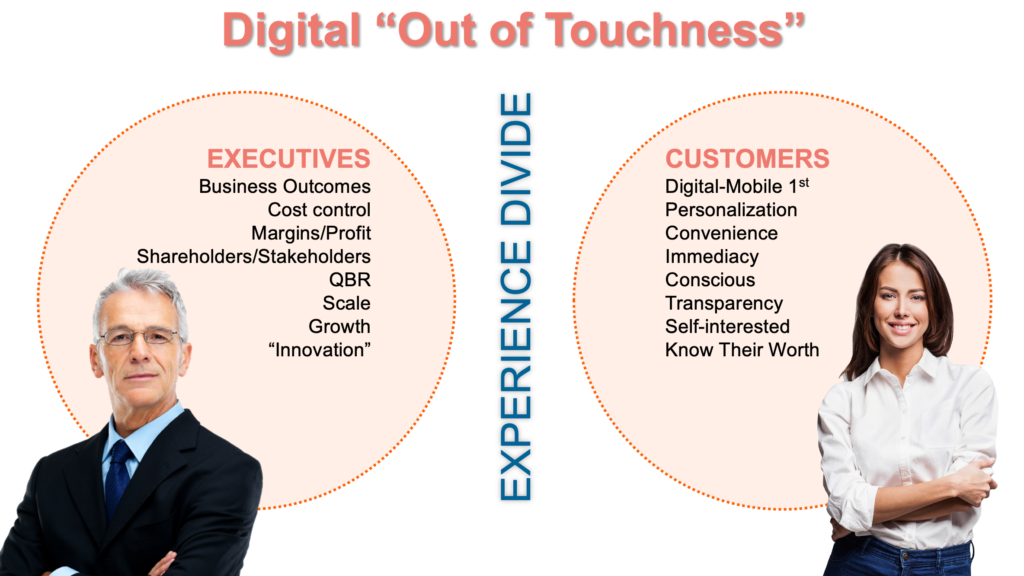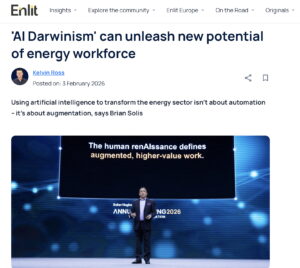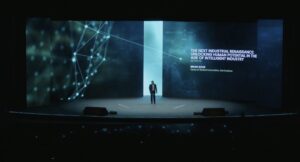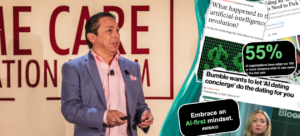
A few years ago, my dear friend Stowe Boyd reached out to ask an important question in regards to future of work and business transformation. His goal was to cast the light directly on the (r)evolution lead by those who want change within the organization and also expose (and inspire) those who don’t. It’s a subject I’ve extensively studied over the years. In fact, I recently published “The Digital Change Agent’s Manifesto” to help those fighting for change learn the art and science of human transformation. I wanted to share his question and my thoughts with you here. I hope it helps you!
Stowe Boyd: All of us — even those with the best perception — are always somewhat out of touch with the exact state of the world we live in. However, during times of great change, the degree of out-of-touchness across a company can grow significantly. Leaders who spend their time with senior staff, working on future-leaning initiatives, and attempting to accelerate adaptation to change may become out of phase with the perceptions of front line and more junior staff.
I’m looking for reflections on the core idea: the degree that companies can tolerate less than total alignment on goals and tactics. To what extent is it possible, beneficial, or desirable? When does creative and fruitful dissent become rebellion or anarchy?
Laggard Executives Put the Fun in Dysfunctional Business Culture
Culture doesn’t eat strategy for breakfast, culture is the strategy.
Cognitive and philosophical dissonance exists in every institution at every level. Even orchestras don’t always communicate or agree in partisan yet operationally, they perform to high standards. In its own functionally dysfunctional way, people still work toward independent or collective goals that work in the short-term.

As the old prophecy goes, “may you live in interesting times.” It’s hard for anyone these days to argue that we don’t live in times where interesting barely describes the state of the world. One slice of this current reality is that we are witnessing the breakneck evolution of technology and society. I refer to this as digital Darwinism, where not only are times changing, but so are markets, human behaviors, values, preferences, etc. The question is however, to what extent does dissonance affect operational performance and potential in an era of digital Darwinism. If technology and society evolve, do businesses operate in unison enough to progress or does fractured or even divergent communication, purpose and efforts slow or completely hinder competition?
I think what we are witnessing in the disruption of businesses, governments and societies around the world makes the case for why organizations need to elevate the humanities to the C-Suite. What worked in the past was a function of the past. Digital Darwinism possesses no prejudice. You either adapt or you don’t. Because many executives are caught in either a state of future shock and/or are so caught up with delivering shareholder or stakeholder value quarter-to-quarter, the ability to lead digital transformation or innovation is constrained as a function of everyday out-of-touchness. But that’s still not an excuse. Times, tastes and behaviors change. Ignorance plus arrogance can only equate to irrelevance.
What we’re really talking about is not just functional dissonance but the need for real change and evolution in mindset and beliefs to survive and thrive. We all can attest that the need for change is easier to dismiss than it is to embrace. It’s only natural for people to only want to see a convenient lie over an inconvenient truth. But all things in time come to a head. It’s a matter of survival of the fitting.
Each of us do not see the world as it really is, we see it with us at the center of everything. Psychologists will show you every reason why organizations function but why many can’t excel in times of disruption. Whether it’s cognitive bias, validation, bias, frequency illusion, the lack of orchestrated harmony suffers from the lack of new vision, leadership and purpose in times of dramatic change and uncertainty.
Within every institution today, there are those who believe that new perspectives and ways are required to progress. Like digital illiteracy and lack of human empathy, dissent is rampant throughout the organization. Unfortunately, pseudo or full-blown ignorance is far more organized than those who do not believe in the current mission and resulting activities. But with structure comes strength and influence.
If you’re waiting for someone to tell you what to do, you’re on the wrong side of innovation. This is less about inspiring a resistance as it is about aligning people around a greater good for everyone inside and outside the organization. Like all great orchestras, evolution and even revolution need a conductor. Not everyone will see or agree on the need for change. But who see the need to fight for change are becoming increasingly inspired and resilient. Whether they succeed in their organization or not doesn’t matter. Darwinism will do what it always does. Dissonance either errs on the side of progress or regression. In either cases, it is the resilient who find a way to endure.

Brian Solis | Author, Keynote Speaker, Futurist
Brian Solis is world-renowned digital analyst, anthropologist and futurist. He is also a sought-after keynote speaker and an 8x best-selling author. In his new book, Lifescale: How to live a more creative, productive and happy life, Brian tackles the struggles of living in a world rife with constant digital distractions. His previous books, X: The Experience When Business Meets Design and What’s the Future of Business explore the future of customer and user experience design and modernizing customer engagement in the four moments of truth.
Invite him to speak at your next event or bring him in to your organization to inspire colleagues, executives and boards of directors.





Leave a Reply